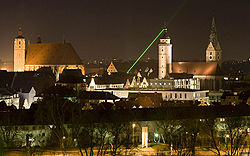city in Bavaria, Germany From Wikipedia, the free encyclopedia
Ingolstadt (US: /ˈɪŋɡəlʃtɑːt, -stɑːt/ ING-gəl-s(h)taht,[2] German: [ˈʔɪŋɡɔlˌʃtat] (![]() listen); Bavarian: Inglstod [ˈʔɪŋl̩ʃtɔːd] or Ingoistod, Latin: Auripolis) is a city in the German state of Bavaria near Munich. It is on the Danube river and has about 127,000 inhabitants.
listen); Bavarian: Inglstod [ˈʔɪŋl̩ʃtɔːd] or Ingoistod, Latin: Auripolis) is a city in the German state of Bavaria near Munich. It is on the Danube river and has about 127,000 inhabitants.
Ingolstadt | |
|---|---|
 Ingolstadt by night | |
| Coordinates: 48°46′N 11°26′E | |
| Country | Germany |
| State | Bavaria |
| Admin. region | Upper Bavaria |
| District | Urban district |
| Subdivisions | 11 Stadtbezirke with 61 Unterbezirken |
| Government | |
| • Lord mayor | Christian Lösel (CSU) |
| Area | |
| • Total | 133.37 km2 (51.49 sq mi) |
| Elevation | 374 m (1,227 ft) |
| Population (2022-12-31)[1] | |
| • Total | 141,029 |
| • Density | 1,100/km2 (2,700/sq mi) |
| Time zone | UTC+01:00 (CET) |
| • Summer (DST) | UTC+02:00 (CEST) |
| Postal codes | 85049–85057 |
| Dialling codes | 0841 08450 (Zuchering, Brunnenreuth) 08424 (Irgertsheim) 08458 (Pettenhofen/Mühlhausen/Dünzlau) 08459 (Niederfeld) |
| Vehicle registration | IN |
| Website | www |
In 1472, Bavaria's first university was founded in Ingolstadt. The Bavarian Reinheitsgebot, a regulation about the purity of beer, was started there in 1516. The car manufacturer Audi has its main base in Ingolstadt.
Ingolstadt is also the setting of Mary Shelley's famous novel Frankenstein.
Seamless Wikipedia browsing. On steroids.
Every time you click a link to Wikipedia, Wiktionary or Wikiquote in your browser's search results, it will show the modern Wikiwand interface.
Wikiwand extension is a five stars, simple, with minimum permission required to keep your browsing private, safe and transparent.